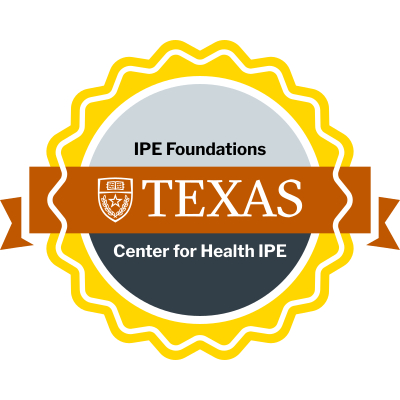IPE Foundations Badge

The focus of IPE Foundations is to convene and engage health professions learners in team-centered learning grounded in the core competencies. Students who earn the IPE Foundations badge have demonstrated an understanding of interprofessional education and the Interprofessional Education Collaborative (IPEC) Core Competencies. IPE Foundations consists of three modules:
- Interprofessional Health Care Team Development
- Teamwork Strategies and Tools in Health Care Practice
- Access to Health Care Services Through an Interprofessional Lens.
Students must complete all activities assigned in these 3 modules in order to earn the IPE Foundations badge, which is awarded by the Center for Health IPE. The HIPE Center collaborates with seven schools with health professions programs to offer quality IPE experiences that prepare a health care workforce for interprofessional collaborative practice.
IPEC Competencies Introduced in IPE Foundations
Values and Ethics (VE): Work with team members to maintain a climate of shared values, ethical conduct, and mutual respect.
VE Sub-Competencies:
- VE1. Promote the values and interests of persons and populations in health care delivery, One Health, and population health initiatives.
- VE2. Advocate for social justice and health equity of persons and populations across the life span.
- VE5. Value the expertise of health professionals and its impacts on team functions and health outcomes.
- VE6. Collaborate with honesty and integrity while striving for health equity and improvements in health outcomes.
Roles and Responsibilities (RR): Use the knowledge of one’s own role and team members’ expertise to address health outcomes.
RR Sub-competencies:
- RR1. Include the full scope of knowledge, skills, and attitudes of team members to provide care that is person-centered, safe, cost effective, timely, efficient, effective, and equitable.
- RR2. Collaborate with others within and outside of the health system to improve health outcomes.
- RR3. Incorporate complementary expertise to meet health needs including the social determinants of health.
- RR4. Differentiate each team member’s role, scope of practice, and responsibility in promoting health outcomes.
Communication (C). Communicate in a responsive, responsible, respectful, and compassionate manner with team members.
C Sub-competencies:
- C1. Communicate one’s roles and responsibilities clearly.
- C2. Use communication tools, techniques, and technologies to enhance team function, well-being, and health outcomes.
- C4. Promote common understanding and teamwork towards shared goals.
- C5. Practice active listening that encourages ideas and opinions of other team members.
- C6. Use constructive feedback to connect, align, and accomplish team goals.
Teams and Teamwork (TT). Apply values and principles of team science to adapt one's own role in a variety of team settings.
TT Sub-competencies:
- TT1. Describe evidence-informed processes of team development and practices.
- TT2. Appreciate team members’ diverse experiences, expertise, cultures, positions, power, and hierarchical roles towards improving team function.
- TT3. Practice team reasoning, problem-solving, and decision-making.
- TT4. Use shared leadership practices to support team effectiveness.
- TT6. Reflect on self and team performance to inform and improve team effectiveness.
- TT7. Share team accountability for outcomes.
Learning Outcomes and Earning Criteria
Learning Outcomes
- Reflect on the primary and overlapping roles and responsibilities of different professions on a health care team.
- Demonstrate interprofessional communication and team interactions in a mutually respectful and responsible manner.
- Assess team dynamics using the IPEC competencies.
- Examine the relationship between interprofessional collaborative practice and improving health outcomes.
Earning Criteria
- Successful completion of all activities in the three modules.
- Team assessment. Guided by the faculty facilitator, students on a team assess their team dynamics using a rubric for the IPEC competencies. The team assesses the extent to which they met each competency, provides examples of what they did well together, and discusses what can be done differently to improve team dynamics.
- Interprofessional communication and team interactions. This is an individual assessment completed by faculty facilitators based on observations of the quality of interactions by a student. A rubric with a 3-point Likert scale is used for the rating. A student must have demonstrated active listening, respectful communication, and contribution to team activities.
- Individual session evaluation. Students complete an evaluation designed to help them understand the key elements of interprofessional education and process their learning by identifying specific elements that helped them achieve learning outcomes.
- Self-assessment and reflection. Students complete a self-assessment of their attainment of the competencies using a validated instrument. This will inform their reflection on interprofessional collaborative practice and improving health outcomes. This will be completed at the end of the third module. The reflections will be reviewed by a faculty team.

